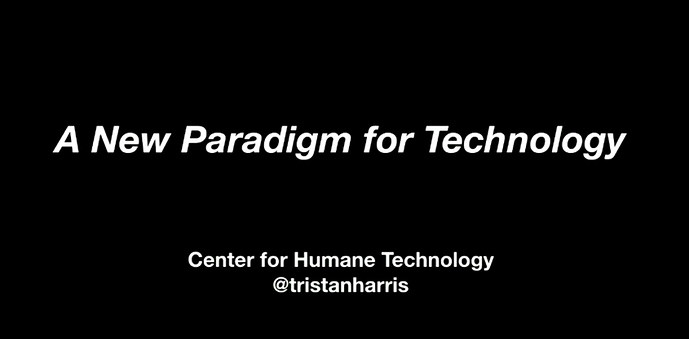This presentation by Tristan Harris at the #RadicalxChange conference in Detroit today identifies toxic qualities commonly found in social networks and offers urgent suggestions for ethical work in this area. Link: https://bit.ly/2HOcoRf Link to Tristan’s org, The Center for Humane Technology: humanetech.com/problem
Hi @richjensen.
I found this VERY interesting, I had not come across it before.
Harris’ insight into the algorithms of youtube and their force for intellectual persuasion got me thinking. It is these algorithms which create an echo chamber of opinion for consumers (we only have to think about the influence of social media on UKs vote on Brexit…). Ultimately it show that connective technology negates users autonomous control over their online experiences and more importantly information access.
Now when we apply this to music, I feel we enter a increasingly sorry state of affairs. For me the most attractive aspect of music is that individuals can freely design their experience, choosing what to listen to and subsequently exploring associated labels, musicians ect. However, many popular streaming services now follow youtube’s model by intruding upon the users journey with ‘up next recommendations’. Ultimately, giving those musicians with the biggest platform the greatest attention and influence.
Having said that a streaming platform, like a record store, needs categorisation to maximise efficient exploration. That is why I feel that resonates curation must reflect the buying and classification habits of music from its users. By collecting this info, we would have a self serviced knowledge hub which can be utilised when designing the UX and journey for listeners.
This would help to rebalance the scal, making music discovery more human centric as opposed to technology driven.
I am not sure what your opinion towards algorithms and music exploration is but if you have any more resources on the topic, I would very much love to know.
Hi @robthomas!
Absolute agreement regarding the necessity of a kind of counter-monolithic (polylithic?) approach to identification. Let these remain user-based parameters with precise specificity. Let me see what Rob has identified as ‘sad’ or ‘trippy’ music without blending all uses of the term. Or if the platform offers that, make it transparent so I can ask for exactly that view.
Regarding my opinion, it’s still plastic. 
In general, I think there is a global struggle underway right now between the humans and their algorithmic agents. Should humans serve the agents or are the agents here in service to the humans?
Perhaps similar to the mind/body question there’s no clear division between these. It may be more of an inter-relation and difference in emphasis that depends on when and why the question is asked. Life as a human may be about working toward a tolerable balance for a while.
In any case, at this moment, my sense of balance is leading me toward spaces where humans practice serving delicate human qualities like listening to work from other humans. 
Interesting point re the power struggle between humans and algorithms. Does playlist culture reduce music to a fleeting background moment or does it make it easier for artists to get their music to the right ears?
It has announced that Spotify are working towards personalised playlists…https://www.billboard.com/articles/business/8504242/spotify-personalize-editorial-playlists-users-tastes
There’s a really great section in the book ‘Ways of Hearing’ by Damon Krukowski about this and the role of real life spaces providing the unexpected rather than something that echoes existing tastes. It talks about populating offline spaces as a form of subversion and there are some really thoughtful discussions around what is considered background noise. It feels maybe relevant to some of the points raised above.

